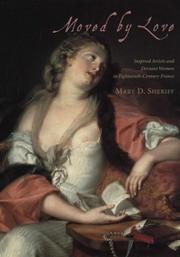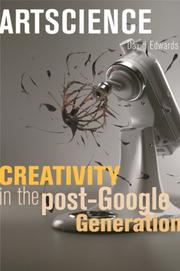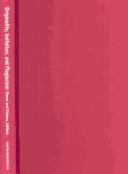| Listing 1 - 10 of 15 | << page >> |
Sort by
|
Book
ISBN: 9782952444072 Year: 2008 Publisher: s. l. Laurent Debarre
Abstract | Keywords | Export | Availability | Bookmark
 Loading...
Loading...Choose an application
- Reference Manager
- EndNote
- RefWorks (Direct export to RefWorks)
Inspiration --- Les aventures de Tintin --- Hergé,
Book
ISBN: 9789004167438 9004167439 9786613060969 9047433548 1283060965 Year: 2008 Publisher: Leiden Brill
Abstract | Keywords | Export | Availability | Bookmark
 Loading...
Loading...Choose an application
- Reference Manager
- EndNote
- RefWorks (Direct export to RefWorks)
Several decades ago canonical criticism came to dominate the study of the canon and even indeed all of biblical studies by its emphasis on the biblical canon's dogmatic content. An investigation of this canonical criticism brings its weak points to light: most notably the insufficient attention that is given to the canon's historical development. This new historical study begins with the earliest stages of the process of forming the canon rather than its final stages as most studies do. It shows how the canon, in essence, was already formed in the early stages of its historical development. It is essentially, synchronically, an authoritative unification of a range of traditions within the faith community, and diachronically, the guide that draws the dynamics of these traditions beyond their discontinuities to produce a continuity.
Bible --- Canon. --- Bible -- Canon. --- Bible -- Concordances. --- Bible -- Inspiration. --- Religion --- Philosophy & Religion --- Christianity --- 22.011 --- Bijbel: canon --- Biblia
Book
ISBN: 3954661675 9783954661671 Year: 2008 Publisher: Berlin [Germany]
Abstract | Keywords | Export | Availability | Bookmark
 Loading...
Loading...Choose an application
- Reference Manager
- EndNote
- RefWorks (Direct export to RefWorks)
Welchen Beitrag leistet die Psychoanalyse zum Verständnis kreativer Prozesse? Welche Ergänzungen erfahren kunsthistorische Arbeiten durch psychoanalytische Untersuchungen zur Biographik und zur Rezeption von Kunst? Mit den in diesem Reader versammelten Texten von Anton Ehrenzweig bis Heinz Kohut und von Pieter C. Kuiper bis Donald W. Winnicott wird der Weg der analytischen Kunstpsychologie im Anschluss an Sigmund Freud nachgezeichnet. Ein Abriss der Psychoanalyse von den Anfängen bis heute, ein kleines Lexikon der Fachbegriffe sowie Erläuterungen zu jedem einzelnen Beitrag machen das Buch sow
Creation (Literary, artistic, etc.) --- Art --- Creative ability in art --- Creative ability in literature --- Imagination --- Inspiration --- Literature --- Creative ability --- Originality --- Psychology.
Book
ISBN: 9780979971303 Year: 2008 Publisher: Ann Arbor (Mich.) : Michigan Classical Press,
Abstract | Keywords | Export | Availability | Bookmark
 Loading...
Loading...Choose an application
- Reference Manager
- EndNote
- RefWorks (Direct export to RefWorks)

ISBN: 1282537741 9786612537745 0226752844 9780226752846 9780226752877 0226752879 9780226752884 0226752887 0226752879 0226752887 9781282537743 6612537744 Year: 2008 Publisher: Chicago (Illinois) University of Chicago Press
Abstract | Keywords | Export | Availability | Bookmark
 Loading...
Loading...Choose an application
- Reference Manager
- EndNote
- RefWorks (Direct export to RefWorks)
In eighteenth-century France, the ability to lose oneself in a character or scene marked both great artists and ideal spectators. Yet it was thought this same passionate enthusiasm, if taken to unreasonable extremes, could also lead to sexual deviance, mental illness-even death. Women and artists were seen as especially susceptible to these negative consequences of creative enthusiasm, and women artists, doubly so. Mary D. Sheriff uses these very different visions of enthusiasm to explore the complex interrelationships among creativity, sexuality, the body and the mind in eighteenth-century France. Drawing on evidence from the visual arts, literature, philosophy, and medicine, she portrays the deviance ascribed to both inspired men and women. But while various mythologies worked to normalize deviance in male artists, women had no justification for their deviance. For instance, the mythical sculptor Pygmalion was cured of an abnormal love for his statue through the making of art. He became a model for creative artists, living happily with his statue come to life. No happy endings, though, were imagined for such inspired women writers as Sappho and Heloise, who burned with erotomania their art could not quench. Even so, Sheriff demonstrates, the perceived connections among sexuality, creativity, and disease also opened artistic opportunities for creative women took full advantage of them. Brilliantly reassessing the links between sexuality and creativity, artistic genius and madness, passion and reason, Moved by Love will profoundly reshape our view of eighteenth- century French culture.
Arts, French --- Creation (Literary, artistic, etc.) --- Pygmalion (Greek mythology) --- Mythology, Greek --- Creative ability in art --- Creative ability in literature --- Art --- Imagination --- Inspiration --- Literature --- Creative ability --- Originality --- French arts --- Themes, motives. --- History --- Héloïse, --- Pygmalion --- Ėloiza, --- Eloisa, --- Heloísa, --- Pigmalione --- History of civilization --- inspiration --- anno 1700-1799 --- France --- Pygmalion (Greek mythology). --- Héloïse --- Arts [French ] --- 18th century --- Themes, motives
Book
ISBN: 9782747570831 2747570835 Year: 2008 Publisher: Paris : l'Harmattan,
Abstract | Keywords | Export | Availability | Bookmark
 Loading...
Loading...Choose an application
- Reference Manager
- EndNote
- RefWorks (Direct export to RefWorks)
Art and society --- Creation (Literary, artistic, etc.) --- #SBIB:316.7C333 --- Creative ability in art --- Creative ability in literature --- Art --- Imagination --- Inspiration --- Literature --- Creative ability --- Originality --- Art and sociology --- Society and art --- Sociology and art --- Kunstenaars --- Social aspects --- Sociology of art

ISBN: 9780674026254 067402625X Year: 2008 Publisher: Cambridge Harvard university
Abstract | Keywords | Export | Availability | Bookmark
 Loading...
Loading...Choose an application
- Reference Manager
- EndNote
- RefWorks (Direct export to RefWorks)
There are scientists, and there are artists. Now, there are art scientists. In his new book, "Artscience: Creativity in the Post-Google Generation", David Edwards explains how this group of thinkers melds the two disciplines in innovative ways to make lasting and important breakthroughs for the betterment of humanity, culture, academia, and industry.
Creation (Literary, artistic, etc.) --- Art and science --- Créativité --- #SBIB:316.7C200 --- #SBIB:39A5 --- kunst --- wetenschap --- kunst en wetenschap --- creativiteit --- 7.01 --- Sociologie van de cultuuruitingen: algemeen --- Kunst, habitat, materiële cultuur en ontspanning --- Creative ability in art --- Creative ability in literature --- Art --- Imagination --- Inspiration --- Literature --- Creative ability --- Originality --- Science and art --- Science

ISBN: 1282445227 9786612445224 0472024442 0472050346 9780472024445 9780472900480 047290048X 9780472070343 0472070347 9780472050345 0472070347 9780472070343 Year: 2008 Publisher: Ann Arbor : University of Michigan Press,
Abstract | Keywords | Export | Availability | Bookmark
 Loading...
Loading...Choose an application
- Reference Manager
- EndNote
- RefWorks (Direct export to RefWorks)
A timely intervention in national debates about what constitutes original or plagiarized writing.
Authorship -- Study and teaching. --- Creation (Literary, artistic, etc.). --- Imitation in literature. --- Plagiarism. --- Plagiarism --- Imitation in literature --- Creation (Literary, artistic, etc.) --- Authorship --- Languages & Literatures --- Literature - General --- Study and teaching --- Authoring (Authorship) --- Writing (Authorship) --- Creative ability in art --- Creative ability in literature --- Literature --- Art --- Imagination --- Inspiration --- Creative ability --- Originality --- Quotation --- Literary style --- Mimesis in literature --- Originality in literature --- Copyright infringement --- Literary ethics --- Torts
Book
ISBN: 047290048X 9780472900480 9786612445224 0472024442 1282445227 Year: 2008 Publisher: Ann Arbor : University of Michigan Press,
Abstract | Keywords | Export | Availability | Bookmark
 Loading...
Loading...Choose an application
- Reference Manager
- EndNote
- RefWorks (Direct export to RefWorks)
A timely intervention in national debates about what constitutes original or plagiarized writing.
Plagiarism. --- Imitation in literature. --- Creation (Literary, artistic, etc.). --- Authorship --- Study and teaching. --- Creative ability in art --- Creative ability in literature --- Art --- Imagination --- Inspiration --- Literature --- Creative ability --- Originality --- Copyright infringement --- Literary ethics --- Quotation --- Torts --- Imitation in literature --- Originality in literature --- Literary style --- Mimesis in literature --- Plagiarism --- Creation (Literary, artistic, etc.)
Book
ISBN: 0226314677 1282005030 9786612005039 9780226314679 9780226314655 0226314650 9780226314662 0226314669 Year: 2008 Publisher: Chicago University of Chicago Press
Abstract | Keywords | Export | Availability | Bookmark
 Loading...
Loading...Choose an application
- Reference Manager
- EndNote
- RefWorks (Direct export to RefWorks)
More and more information is pumped into our media-saturated world every day, yet Americans seem to know less and less. In a society where who you are is defined by what you buy, and where we prefer to experience reality by watching it on TV, Eugene Halton argues something has clearly gone wrong. Luckily Halton, with scalpel-sharp wit in one hand and the balm of wisdom in the other, is here to operate on the declining body politic. His initial diagnosis is bleak: fast food and too much time spent sitting, whether in our cars or on our couches, are ruining our bodies, while our minds are weakened by the proliferation of electronic devices-TVs, computers, cell phones, iPods, video games-and their alienating effects. If we are losing the battle between autonomy and automation, he asks, how can our culture regain self-sufficiency? Halton finds the answer in the inspiring visions-deeply rooted in American culture-of an organic and more spontaneous life at the heart of the work of master craftsman Wharton Esherick, legendary blues singer Muddy Waters, urban critic Lewis Mumford, and artist Maya Lin, among others. A scathing and original jeremiad against modern materialism, The Great Brain Suck is also a series of epiphanies of a simpler but more profound life.
National characteristics, American. --- Popular culture --- Political culture --- American national characteristics --- United States --- Civilization. --- Intellectual life. --- Social conditions. --- Politics and government. --- Government --- History, Political --- sociology, sociological, sociologists, united states of america, american culture, usa, society, self-sufficiency, communication, national characteristics, nation, pubic conceptions, popular ideas, civilization, social conditions, politics, political engagement, democracy, intellectual life, inspiration, materialism, living, alienation, distance, connections, discovery, understanding, epiphany, realization, recognition.
| Listing 1 - 10 of 15 | << page >> |
Sort by
|

 Search
Search Feedback
Feedback About UniCat
About UniCat  Help
Help News
News